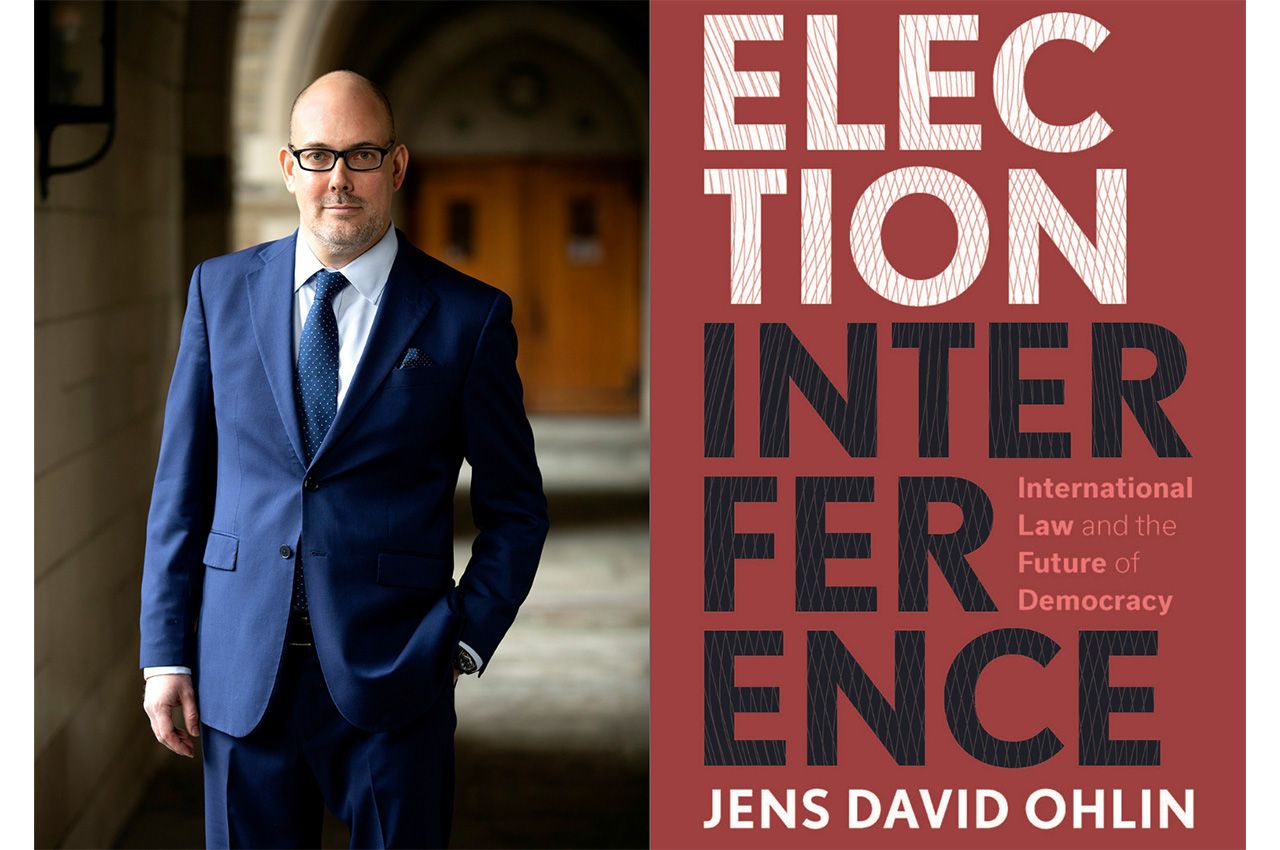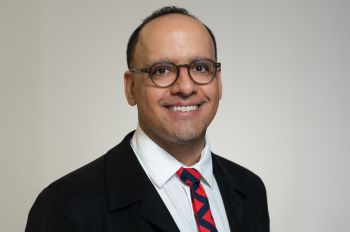Palmer Prize Winner’s Book Explores How to Legally Define Foreign Interference In U.S. Elections—and What Should be Done About It

While discussing the consequences of foreign interference in United States elections with colleagues, Jens David Ohlin often fielded a seemingly simple question: whether it was illegal.
Yes, he believed it was. But not for the reasons everyone seemed to think: Rather than an attack on U.S. sovereignty, or a case of cyberwarfare, such interference was best understood as a violation of a crucial tenet of international law.
Self-determination: the right of a country’s citizens to decide their own destiny.
It was this concept, coupled with the gravity of an issue that he does not see growing any smaller, which led Ohlin to write Election Interference: International Law and the Future of Democracy, the recipient of the 2021 Chicago-Kent College of Law Roy C. Palmer Civil Liberties Prize.
“Election Interference examines an urgent challenge of American law and national security: how to protect the United States against efforts by foreign nations to influence the outcomes of American elections?” Chicago-Kent’s Palmer Prize Committee wrote in its recommendation of Ohlin’s book. “Filled with information, insights, and sharp analysis, Election Interference is an essential contribution to our understanding of one of the greatest threats to American democracy today.”
Ohlin, who is the Allan R. Tessler Dean and Professor of Law at Cornell Law School and a specialist in international law, says “the 2016 [presidential] election loomed large in my thinking” when he sat down to write his book.
And so he used that specific election as a case study for the book, which was published by Cambridge University Press in 2020.
When defining election interference, Ohlin speaks specifically about such things as the coordinated use of troll farms controlled by the Russian Internet Research Agency to post inflammatory, divisive, and false information on social media, according to reports by the U.S. intelligence community. Leveraging the anonymity of the internet, the accounts, Ohlin notes, were specifically designed to look like U.S. citizens. And while their opinions appeared to support one candidate or the other, the overarching motive was to erode trust in the electoral process and support Russia’s strategic interests, Ohlin says.
Such a tactic was a game-changer, and one not likely to go away soon, he adds.
“It seems right to say that Russia’s interference in the 2016 election represented a sea change in foreign interference,” Ohlin writes.

But how was it illegal?
Many posited that the tactic was an attack on U.S. sovereignty. Others called it a cyberattack. Both accusations were wrong, in Ohlin’s opinion.
To meet the definition of a cyberattack under international law, such attacks needed to cause actual physical damage to such things as infrastructure, military targets, or financial institutions, which they did not.
“The rules regarding cyberattacks are still in development and somewhat contested. Election interference was not foremost on the minds of the drafters of the Tallinn Manual,” Ohlin states, referring to an academic study on how international law applies to cyberwarfare.
And violations of national “sovereignty” were typically acts that usurped governmental functions. If it was proven that voting machines had been hacked, for instance, the sovereignty argument would be more applicable.
Rather, Ohlin believes such tactics violated another tenet of international law: self-determination, or the right of a country’s citizens to make their own political choices free of foreign interference.
“When the Russians intervened in the 2016 election, they denied the right of the American people to decide their own destiny through the democratic process,” Ohlin writes.
Ohlin further worries that the current legal framework isn’t ideal for countering future interference, which he believes will only intensify and be employed by other countries.
“If anything, the current state of the law is the product of regulating prior threats,” Ohlin says.
The Foreign Agent Registration Act was designed to counter old Nazi propaganda efforts. Campaign finance regulations were designed to prohibit foreign monetary donations.
“Neither of these regulatory regimes is particularly on point for regulating social media electioneering by foreign powers,” Ohlin says. “In fact, just the opposite…today’s law is arguably anachronistic and out of step with contemporary dangers.”
As for solutions, Ohlin suggests several.
In the interests of improving transparency and robbing foreign actors of one of their most useful tools—anonymity—he suggests that social media platforms, either voluntarily or through a legal mandate, explore avenues to label posts that have a foreign origin.
He also suggests that Congress enact a new federal statute explicitly criminalizing the solicitation of foreign involvement in federal elections.
“Nothing specific exists, but there is debate on whether or not it is already illegal. You could remove any doubt by passing a new statute specifically tailored to this circumstance,” Ohlin writes.
Finally, he notes that part of the problem lies within the U.S. intelligence community itself.
“Unfortunately, the U.S. government response to election interference is controlled by counterintelligence agencies that have limited experience with information disclosure,” Ohlin writes. “These agencies are built to keep and protect secrets, not disclose information to the public.”
Ohlin suggests that the U.S. Department of Justice use criminal prosecutions to explicitly inform the public about future cases of election interference, and build a “systemic capacity for information disclosure” when it comes to cases of election interference.
When asked if he could get one person to read the book, who would it be, Ohlin replies that when he was writing it, “I wanted to have given it to the general counsel of Twitter. But since I wrote the book, I feel that Twitter has taken election interference seriously. I feel they understand the gravity of the situation and are at least trying.
“Now I would want to give it to the [U.S.] director of national intelligence. Explaining to them that they have to work with the rest of the government to try to publicize these foreign attacks.”
The Palmer Prize was established in spring 2007 by Roy C. Palmer ’62 and his wife, Susan M. Palmer, to honor a work of scholarship exploring the tension between civil liberties and national security in contemporary American society.
The $10,000 prize is designed to encourage and reward public debate among scholars on current issues affecting the rights of individuals and the responsibilities of governments throughout the world.



